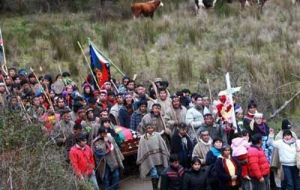MercoPress. South Atlantic News Agency
Chilean police charged with shooting and killing Mapuche activist
 The killing of the Mapuche activities sparked riots and arson in Santiago
The killing of the Mapuche activities sparked riots and arson in Santiago Chilean military authorities have decided to press charges against José Patricio Jara Muñoz, the Carabinero (uniformed police) officer who shot and killed Mapuche activist Jaime Mendoza Collío during a confrontation last week in Region IX. Jara Muñoz is accused of using excessive force resulting in death. Mauches are Chile’s largest indigenous group.
The incident took place last Wednesday when a group of some 50 Mapuche activists tried to occupy a farm over which they claim ancestral ownership. At approximately 3 p.m., heavily armed Carabineros advanced on the property with orders to remove the Mapuches.
During the scuffle that ensued, Jara Muñoz fired his 9 mm pistol, fatally wounding 24-year-old Mendoza Collío.
Jara Muñoz, a member of a Special Forces unit known as GOPE, claimed self defence, saying he and his colleagues were ambushed. The Carabineros also said Jara Muñoz was struck by buckshot before dispatching his weapon, suggesting the victim had a gun.
Witnesses told a different story, saying Mendoza Collío and his colleagues were unarmed and actually being chased by police when the fatal shot went off. An initial autopsy report confirms the witness accounts, revealing that Mendoza Collío was shot in the back – not in the chest, as initially reported.
Chile’s Investigations Police (PDI) also confirmed that Mendoza Collío’s corpse showed no traces of gun powder. His body did show signs, however, of major bruising, suggesting – as witnesses claim – that after felling Mendoza Collío with a gunshot, Jara Muñoz then kicked the prone victim several times.
On Sunday a funeral service was held for Mendoza Collío’s in the Mapuche township of Requem Pillán de Ercilla. The event attracted several thousand participants as well as a formidable police presence. Among those in attendance were Mapuche-Pehuenche sisters Berta and Nocolasa Quintremán, famous for trying to prevent construction of Chile’s largest hydroelectric dam, Ralco. Also present was pro-Mapuche activist Patricia Troncoso, better known as “La Chepa.”
Troncoso, imprisoned at the time, gained national attention last year when she endured a life-threatening, 110-day hunger strike.
Community members laid Mendoza Collío to rest in the same cemetery where Alex Lemún is buried. Lemún was shot by police during an attempted land occupation in November 2008.
The 18-year-old Mapuche activist died after spending five days in a coma. Police killed a third Mapuche, Matías Catrileo, under similar circumstances in January 2008.
Because the Carabineros are a branch of Chile’s armed forces Jara Muñoz will be tried by a military tribunal rather than a civilian court. Mapuche activists, in contrast, enjoy no such protections and have, in some cases, been tried under a dictatorship-era anti-terrorism law that squashes many of their basic legal defence rights.
The law, first established in 1984 during the Augusto Pinochet military regime, provides prosecutors with special privileges by allowing, for example, testimony from anonymous witnesses.
The organization Human Rights Watch (HRW) describes it as the “harshest” of all Chilean statutes. Mendoza Collío’s death has fired up already heightened tensions between Chilean authorities and Mapuches, the country’s largest indigenous group. In recent days, pro-Mapuche demonstrations have taken place throughout the country, including in Santiago.
According to the 2002 census, there are 609,000 self-proclaimed Mapuches in Chile. Roughly 32% of that population lives in Region IX, also known as the Araucanía.
There, as well as in neighbouring Region VIII (Biobío), Mapuche groups lay claim to ancestral lands totalling thousands of hectares. Over the past decade, Mapuche groups have organized numerous symbolic land occupations and, in some cases, carried out arson attacks.
By Patagonia Times Staff (patagoniatimes@gmail.com)




Top Comments
Disclaimer & comment rulesCommenting for this story is now closed.
If you have a Facebook account, become a fan and comment on our Facebook Page!